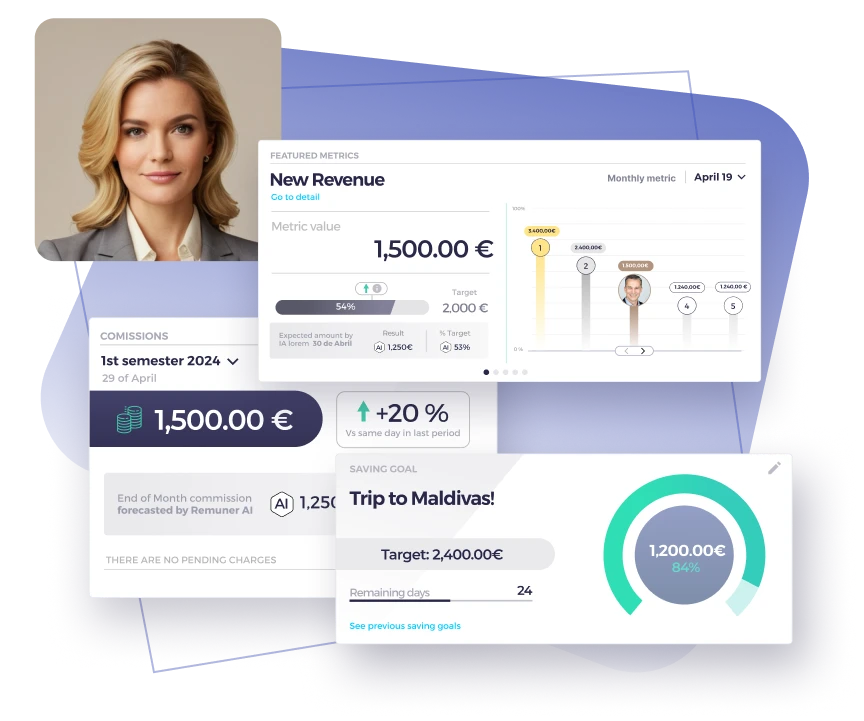Table of contents
Designing a successful sales rep incentive program isn’t just about throwing out bonuses or sending occasional gift cards. It’s about understanding what motivates reps to meet and exceed their sales goals, driving high performance consistently over time.
Whether you’re leading a startup revenue team or managing a large enterprise sales org, the structure of your sales incentives can make or break your ability to retain top talent, hit quota, and build a performance-based culture. In this guide, we’ll show you how to craft an effective sales incentive program, explore the most impactful types of sales incentives, and highlight real-world examples. You’ll also learn how platforms like Remuner help streamline your compensation strategy for clarity and results.
Why sales rep incentive programs matter
A sales rep who’s unclear about their incentives is a disengaged rep. Motivation starts with knowing exactly how success is measured—and how it’s rewarded. A well-designed sales rep incentive program creates alignment between what the company values and what the rep strives for.
Key benefits of a strong incentive program:
- Boosts closing deals and quarterly attainment
- Reduces turnover by rewarding long-term contributions
- Creates a culture of professional development and ownership
- Helps sales leaders identify and replicate top-performing behaviors
- Encourages collaboration and healthy competition
And when monetary rewards are backed by transparency, tools like Remuner ensure that reps trust the process and feel confident in their earning potential. One study by the Alexander Group found that sales reps who clearly understand their comp plans are 33% more likely to feel satisfied in their roles.
The anatomy of an effective sales incentive program
You can’t build the right plan without understanding the pieces that drive motivation. Let’s break down the foundation of a compelling sales incentives structure:
1. Clear sales goals
Align each incentive to an outcome—whether it’s revenue, deal volume, product mix, or renewal rates.
2. Defined quota and OTE
Ensure each sales rep understands their on-target earnings (OTE) and how to reach it through measurable performance.
3. Tiered incentives
Offer more than just “hit quota or miss.” Introduce accelerators for surpassing targets, decelerators for underperformance, and bonuses for specific product lines.
4. Based rewards
Include both monetary incentives (like bonuses and commissions) and non-cash options (gift cards, paid trips, recognition).
5. Real-time visibility
Salespeople need to know where they stand. Tools like Remuner give reps and managers instant access to progress dashboards, comp breakdowns, and payout forecasts.
When setting quota and defining OTE, it’s essential to benchmark expectations against real industry standards. For current data on earnings, job outlook, and sales rep responsibilities, see the sales rep compensation and role outlook provided by the U.S. Bureau of Labor Statistics.
Popular types of sales incentives
Incentives don’t only mean money. Variety is often what drives results, especially when paired with a team’s preferences and culture.
1. Monetary rewards
The classic choice: base + commission. Use this as a foundation, but add layers to create excitement.
Examples:
- Bonus for every deal over $50,000
- Quarterly bonus for exceeding 120% of quota
- Annual accelerators for top 10% of reps
2. Gift cards and spot rewards
Quick wins for behavior-based achievements (first to book 10 meetings, best pitch of the week).
3. Team-based rewards
Sometimes, collaboration deserves recognition. Offer team dinners, retreat invites, or shared bonuses if collective targets are met.
4. Professional development
Fund certifications, conferences, or training for top performers. It sends a message: “We invest in long-term success.”
🎯 Remuner helps you automate and track both individual and team-based incentive plans, so no achievement goes unnoticed. See how Remuner’s performance tracking makes that easy or book a demo to discover it!
Real-world examples of sales rep incentive programs
1. SaaS Startup – Tiered Quota Bonus
A high-growth SaaS company created a three-tier incentive structure:
- Tier 1: Hit 100% of quota → standard commission
- Tier 2: Hit 120% of quota → 1.5x multiplier
- Tier 3: Hit 150%+ → 2x bonus payout
Result: 40% more reps hit Tier 2, and average revenue per rep increased by 18%.
2. Enterprise Tech – Product Focus Incentive
To push a new product line, the company offered an additional $1,000 for every five deals that included the new feature.
Result: Reps didn’t just sell more—they sold smarter, and the product adoption rate jumped 35%.
3. Agency Sales – Weekly SPIFs
One digital agency rotated fun weekly challenges: most calls, fastest deal, biggest upsell. Prizes ranged from gift cards to an afternoon off.
Result: Improved short-term productivity and boosted morale.
How to motivate your sales team long term
A great sales rep incentive program builds momentum, but sustaining motivation takes more than prizes. Focus on culture and leadership too.
Tips for long-term motivation:
- Recognize top and rising performers weekly or monthly
- Set realistic but ambitious quotas that evolve with market shifts
- Mix group and individual rewards to balance teamwork and personal drive
- Create learning incentives—like training completions tied to bonuses
- Celebrate milestones (first deal, five-year anniversary, etc.)
With Remuner, you can centralize these rewards and track impact over time. The platform helps you analyze what types of incentives create the highest lift in sales performance.
Mistakes to avoid in sales incentive planning
Not all incentives work as intended. Avoid these common pitfalls:
- Overcomplicating the plan
If your reps need a calculator to understand their comp, it’s too complex. - Ignoring underperformance
Incentive programs should support coaching—not just reward the top 10%. - Misaligned KPIs
Don’t reward vanity metrics. Tie rewards to business-driving actions and closing deals. - Lack of transparency
Confusion leads to mistrust. Use platforms like Remuner to give every team member visibility into their path to rewards.
Best practices for implementing incentive programs
When rolling out a new plan, execution matters as much as strategy. Here’s how to do it right:
- Communicate early and often
Involve reps in program development. Explain the “why” behind changes. - Pilot new ideas
Test new rewards or structures with one team before company-wide adoption. - Use data to refine
Analyze which incentives drive behavior and which fall flat. Adjust quarterly. - Automate payout tracking
Manual comp tracking creates errors and stress. Use Remuner to calculate, track, and visualize earnings automatically. - Celebrate wins consistently
Incentives work better when paired with recognition. Praise publicly. Reward privately.
🔧 Ready to simplify your incentive tracking and drive performance? Book a demo with Remuner to see how you can automate commission tracking, align incentives, and keep your team focused on results.
FAQs about Sales rep incentive programs
What are sales rep incentive programs?
These are structured plans that offer rewards to sales reps for achieving performance benchmarks, such as hitting quota, closing deals, or generating leads.
What types of sales incentives are most effective?
A mix of monetary rewards, gift cards, professional development, and team-based bonuses work best, depending on your sales culture.
How do I know if my sales incentives are working?
Track performance before and after incentives launch. Look for improved quota attainment, deal volume, and rep satisfaction. Tools like Remuner help measure these trends.
How often should I update my incentive program?
Review your plans quarterly. Refreshing sales incentive ideas helps keep reps engaged and aligned with shifting business goals.
Should I include team-based rewards or only individual ones?
Both. Individual incentives drive accountability; team-based rewards foster collaboration.
Can Remuner help manage incentive programs?
Absolutely. Remuner automates tracking, offers performance dashboards, and enables real-time comp visibility—making it easier to run effective, motivating programs.





